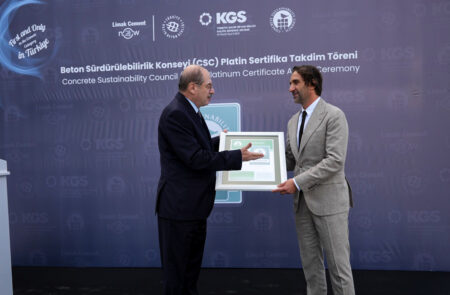The Turkish Ready Mixed Concrete Association (THBB) has published the June 2025 report of the “Ready Mixed Concrete Index,” which reflects the current situation and expected developments in the construction-related manufacturing and service sectors. While the Activity Index hovered around the threshold level in March and April, it showed a notable increase in May but fell back below the threshold in June. Although all indices except for the Confidence Index are higher than the same period last year, their remaining below the threshold limits the overall positive outlook.

Recognized as a leading indicator of growth in the construction sector, the Ready-Mixed Concrete Index report reveals that the Expectation and Confidence Indices continue to remain at low levels, while the Composite Index has also declined in parallel with the contraction in activity. The Expectation Index has remained in negative territory for the past six months, and although the Confidence Index showed a limited increase, it remained below the threshold.

Commenting on the report’s findings, THBB Chairman Yavuz Işık stated, “While the Activity Index hovered around the threshold in March and April and showed a significant rise in May, it again fell below the threshold in June. The fact that all indices except for the Confidence Index are higher compared to last year can be seen as a positive signal for the construction sector; however, the fact that all indices remain below the threshold significantly overshadows this optimistic picture.”
Evaluating the broader economic context, Chairman Işık added, “According to the June 2025 Türkiye PMI data by the Istanbul Chamber of Industry (ISO), the headline PMI declined from 47.2 in May to 46.7 in June, marking the lowest level in the past eight months. These figures, remaining below the critical threshold of 50, indicate a contraction. While monetary policy seems to be approaching its targeted point, the delayed impact of these measures is intensifying the adverse effects on the economy. Persistently high interest rates are increasing financing costs for companies, while restrictions on credit expansion are making it more difficult for firms to access financing. The latest data reveals that domestic demand saw a noticeable decline in June. In July, economic actors both in Türkiye and globally are closely watching interest rate decisions from central banks. Following the announcements from the Central Bank of the Republic of Türkiye (CBRT) and the European Central Bank (ECB), the U.S. Federal Reserve (FED) will also disclose its decision. Even a cautious start to interest rate cuts in July in Türkiye would positively impact the construction sector in the following quarter.”






